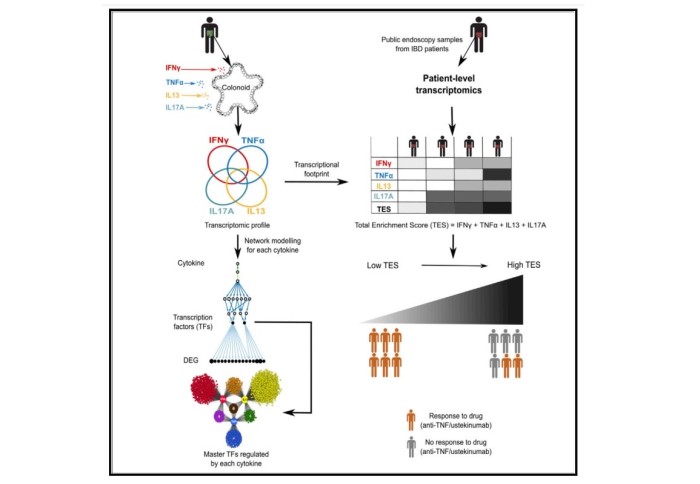Molecular classification of inflammatory bowel disease

New research maps how gene expression is regulated by cytokines, paving the way for personalised medicine approaches in inflammatory bowel diseases.
Inflammatory bowel diseases, namely Crohn’s disease and ulcerative colitis, are long-term, incurable conditions driven by gut inflammation leading to poor quality of life, increased risk of cancer, and severe complications. A better understanding of the interactions between the immune system and the epithelium, the layer separating the host (ourselves) from the environment, is necessary to achieve the goal of personalising care to the individual person, improving the use of available treatments, and, importantly, developing medical cures.
"This work adds to our understanding of the immune-epithelial interactions at the gut barrier and paves the way for personalised medicine approaches in inflammatory bowel diseases." Dr. Nick Powell Clinical Reader in Gastroenterology
New research from Imperial and King College London, published in Nature Communications and Cell Reports, has used human colonic organoids, which are 3D models of the human epithelium, to map how gene expression is regulated by cytokines, the key chemicals that mediate immune responses and control inflammation. These maps allowed the team to identify a large overlap across different cytokines on the regulation of gene expression, as well as highlight signalling bottlenecks.
By associating those maps with the gene expression changes seen in inflammatory bowel diseases, the team was able to separate patients into groups with prognostic implications. Unexpectedly, rather than separating based on the type of predominant immune response, patients were grouped by a gradient of immune response complexity. Those patients with multiple immune responses did not benefit from advanced therapies that target only some of those responses.
The team was able to show that the gene expression regulated by interleukin 22, a cytokine considered to play a key role in fighting infections and helping the epithelium regenerate, is enriched in the gut of patients with ulcerative colitis. Surprisingly, higher expression of these interleukin 22 regulated genes are associated with a higher risk of non-response to ustekinumab, a recently introduced advanced therapy. Using data from a large phase 3 clinical trial and an animal model of ulcerative colitis, the team showed that interleukin 22 regulates the influx of neutrophils to the epithelium and contributes to gut inflammation and disease.
Speaking about the research, Dr. Nick Powell from the Department of Metabolism, Digestion and Reproduction and senior author on both papers, said: "The team plans further work in this area, with efforts now focusing on refining this predictive tool and incorporating it into treatment pathways that will allow a more personalised approach to managing inflammatory bowel diseases."
Dr. Polychronis Pavlidis, Clinical Lecturer in Gastroenterology at Kings College and first author on both papers, said: "I am delighted to see our work published and shared with the wider community. I am grateful to all the patients who participated and our fantastic collaborators from the NHS, academia, and Janssen Pharmaceuticals who contributed to this work. I am hopeful that we can translate the lessons we learned to better tailored treatments and outcomes for our patients."
Polychronis Pavlidis, Anastasia Tsakmaki, Eirini Pantazi, Katherine Li, Domenico Cozzetto, Jonathan Digby- Bell, Feifei Yang, Jonathan W. Lo, Elena Alberts, Ana Caroline Costa Sa, Umar Niazi, Joshua Friedman, Anna K. Long, Yuchun Ding, Christopher D. Carey, Christopher Lamb, Mansoor Saqi, Matthew Madgwick, Leila Gul, Agatha Treveil, Tamas Korcsmaros, Thomas T. Macdonald, Graham M. Lord, Gavin Bewick & Nick Powell. Interleukin-22 regulates neutrophil recruitment in ulcerative colitis and is associated with resistance to ustekinumab therapy. Nat Commun 13, 5820 (2022). https://doi.org/10.1038/s41467-022-33331-8
Polychronis Pavlidis, Anastasia Tsakmaki, Agatha Treveil, Katherine Li, Domenico Cozzetto, Feifei Yang, Umar Niazi, Bu Hussain Hayee, Mansoor Saqi, Joshua Friedman, Tamas Korcsmaros, Gavin Bewick & Nick Powell.
Cytokine responsive networks in human colonic epithelial organoids unveil a molecular classification of inflammatory bowel disease. Cell Reports, Volume 40, Issue 13, 2022, https://doi.org/10.1016/j.celrep.2022.111439
Article text (excluding photos or graphics) © Imperial College London.
Photos and graphics subject to third party copyright used with permission or © Imperial College London.
Reporter
Benjie Coleman
Department of Surgery & Cancer